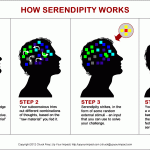 Serendipity is undoubtedly a nice skill to have as it opens us up to a world of opportunities. While we might be mistaken for thinking that it’s very nature makes it a game of chance, New York University’s Christian Busch argues in The Serendipity Mindset that it is in fact a skill we can learn, with masters able to spot and act on the kind of unexpected connections that so typify serendipitous encounters.
Serendipity is undoubtedly a nice skill to have as it opens us up to a world of opportunities. While we might be mistaken for thinking that it’s very nature makes it a game of chance, New York University’s Christian Busch argues in The Serendipity Mindset that it is in fact a skill we can learn, with masters able to spot and act on the kind of unexpected connections that so typify serendipitous encounters.
Busch argues that such a mindset is even more important today, as not only is the world changing so rapidly, but we have also developed to prize linear thinking rather than the more emergent form that has been typified by 2020.
This ability to cope with the unexpected is something that the best among us have in spades, and Busch highlights how in his research it has become common for the unexpected to be viewed as an opportunity rather than a threat.
Developing the serendipity mindset
He outlines three things we can all do to develop such a serendipity mindset:
- Cultivating serendipity spotting, which involves really paying attention to the unexpected, both in terms of big things and small things. This process can be vital in skewering assumptions that are wrong, which in turn opens our minds to new ways of doing things.
- De-risking ideas, which involve the development of an environment that encourages risk-taking and the cross-pollination of ideas. This notion of learning from failure and creating psychological safety have both been well explored by other thinkers and play a big role in creative thinking.
- Developing an environment of trust, which builds upon this inherent de-risking, as it will be impossible to truly experiment if you’re always worried about the consequences.
Standing in the way are a number of biases that prevent us from developing the serendipity mindset, including our tendency to underestimate the unexpected, post-rationalize events, and conform to the majority.
Arguably the most inhibiting of these biases is our willingness to underestimate the unexpected, which Busch argues can be best combated by discarding the “risk management” approach we so often take and instead develop our ability to find potential in the unexpected.
It could be argued that a lot about the book is bringing together theories that have already existed for some time, but equally, it can take a long time for beneficial concepts to truly take hold, so a bit of reinforcement can be no bad thing. Heaven knows we need some adaptive thinking at the moment to cope with this most uncertain of periods.